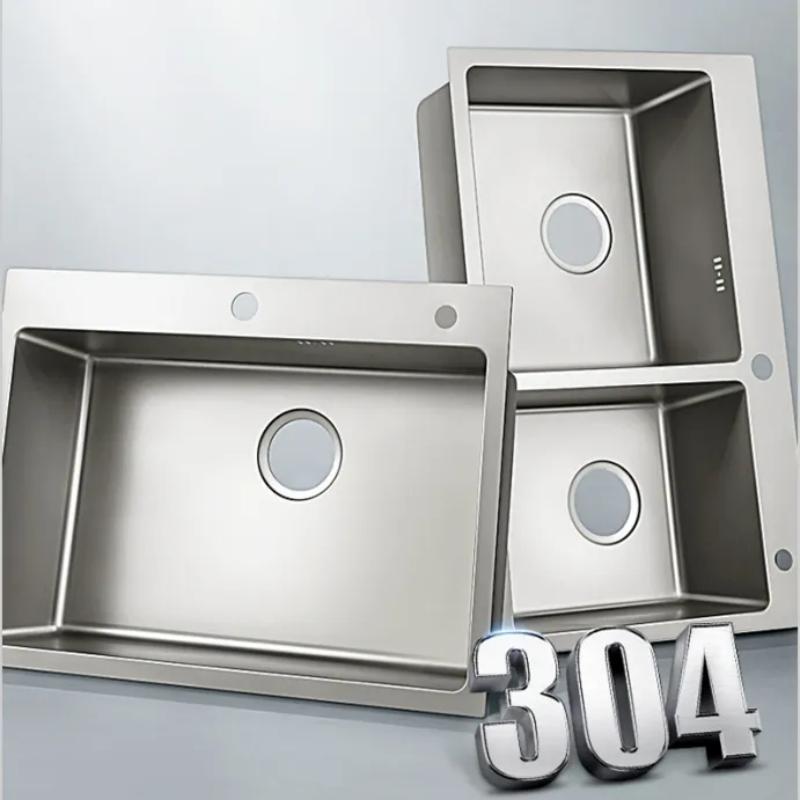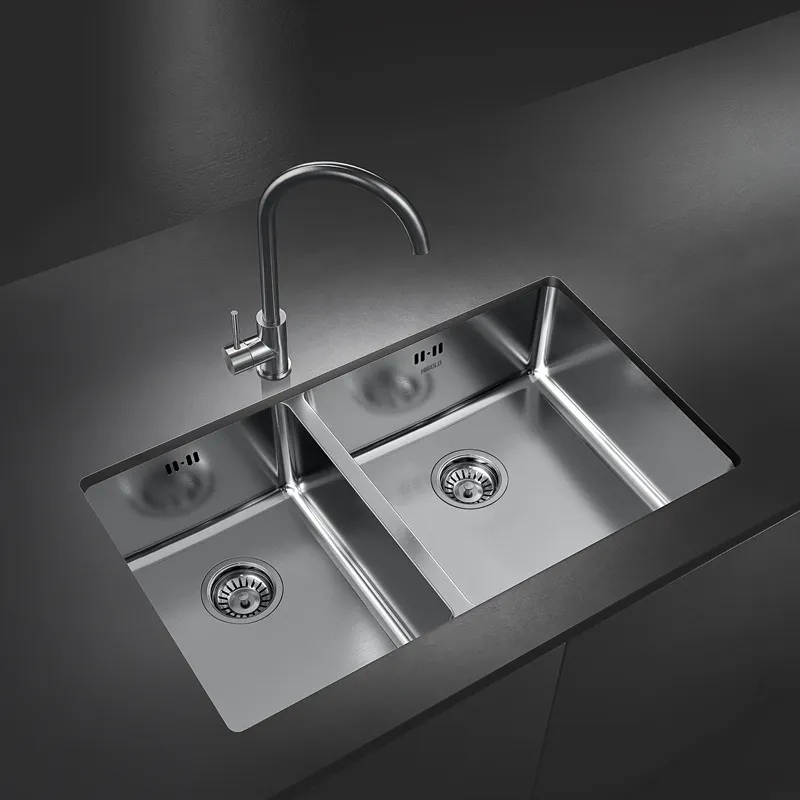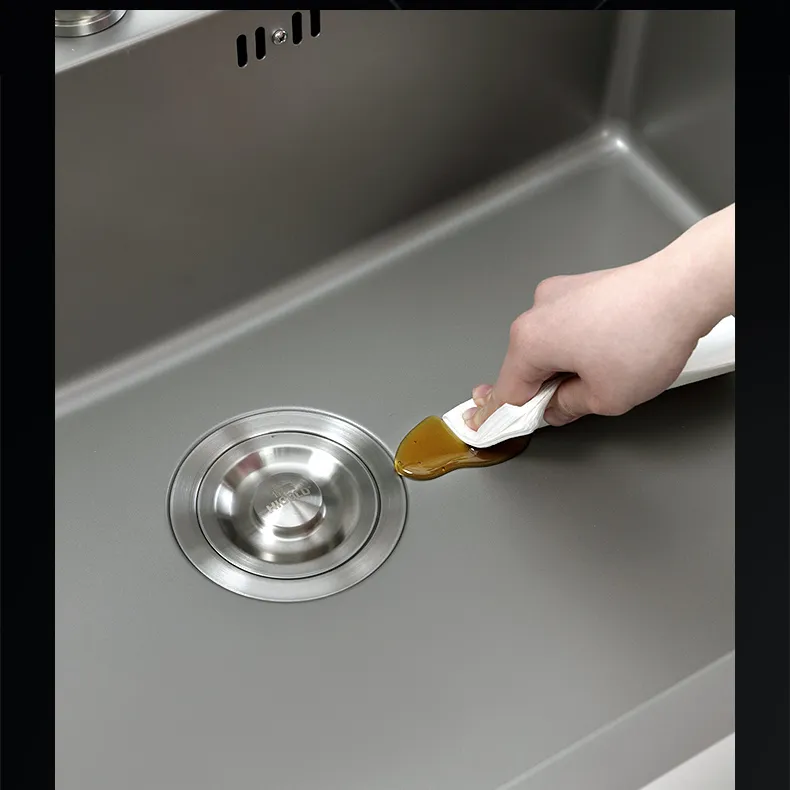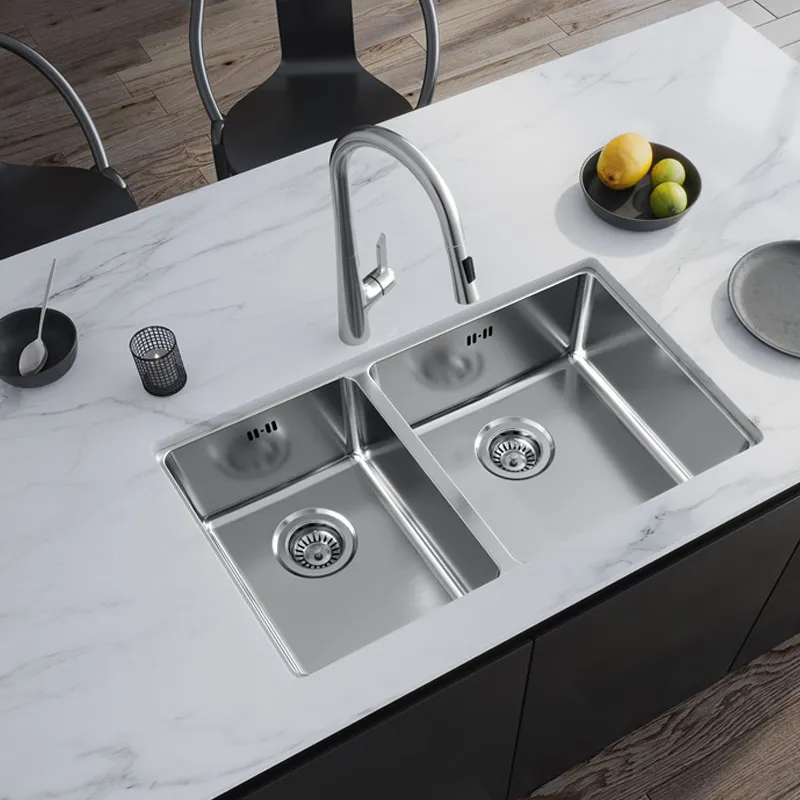Stainless steel kitchen sinks are a standard feature in modern kitchens. They are widely popular for their corrosion resistance, durability, and ease of cleaning.
However, many consumers are surprised to discover that even newly installed brand new stainless steel sinks can develop rust within a short period of time. This phenomenon has puzzled many families: if it's called "stainless steel," why would it rust?
With this common question in mind, our reporter conducted an in-depth review of the material properties, production process, usage environment, and maintenance methods of stainless steel kitchen sinks, attempting to uncover the real reasons behind brand new stainless steel kitchen sinks rusting.

Why are stainless steel kitchen sinks called "stainless"?
To understand why brand new stainless steel kitchen sinks rust, we first need to clarify the true meaning of "stainless steel."
1. Definition of Stainless Steel
Stainless steel is not a "rust-proof" material; it is a type of alloy steel with a high chromium content. Generally speaking, when the chromium content in steel reaches 10.5% or above, a dense chromium oxide passivation film forms on the metal surface, preventing further oxidation of the iron and exhibiting its "rust-resistant" properties.
2. "Stainless" Doesn't Mean "Absolutely Stainless"
"Stainless" refers to excellent corrosion resistance under most normal conditions. However, under special conditions, such as prolonged exposure to strong acids, strong bases, salt, or chlorine-containing substances, stainless steel can also corrode and develop rust spots.
3. The Special Characteristics of the Kitchen Environment
Kitchen water may contain chloride ions and salt, and washing food can also produce acidic or alkaline residues. These combined factors put even brand-new stainless steel kitchen sinks at risk of rust.
Therefore, consumers can easily be confused when purchasing or using a brand-new stainless steel kitchen sink if they have a misunderstanding of what "stainless" means.

What Causes a Brand-New Stainless Steel Sink to Rust?
Although stainless steel kitchen sinks are corrosion-resistant, they can still rust under certain conditions. In summary, the main causes include the following:
1. Damage to the Surface Passivation Film
The chromium oxide passivation film on the surface of stainless steel is key to preventing rust. Once this protective film is damaged by mechanical scratches, improper cleaning, or chemical corrosion, the exposed metal substrate reacts with moisture and oxygen in the air, resulting in rust spots.
2. Contamination by Iron Filings or Impurities
During transportation, installation, or construction, iron filings, dust, and other impurities may adhere to the surface of stainless steel kitchen sinks. When these impurities come into contact with water, they first rust and spread to the sink surface, causing the sink itself to appear rusty.
3. Humid Operating Environment
The kitchen is inherently a high-humidity environment. If ventilation is insufficient, water droplets remaining on the surface of a stainless steel kitchen sink over time can easily form rust spots.
4. Chemical Corrosion
Common substances such as detergents, bleach, chlorine-containing cleaners, salt, soy sauce, and vinegar can react chemically with stainless steel, damaging its surface protective film and causing localized rust.
5. Water Quality Issues
If your tap water is hard and contains high levels of minerals or chloride ions, long-term adhesion to the surface of your stainless steel kitchen sink can also accelerate rust formation.

The Impact of Material Differences on the Rust Resistance of Stainless Steel Sinks
Not all stainless steel kitchen sinks are created equal in terms of rust resistance. Common stainless steel materials include the following:
1. 201 Stainless Steel
It has a low nickel content, relatively poor corrosion resistance, and is relatively inexpensive. Some low-end stainless steel sinks use 201, which is more susceptible to rust in humid or salty environments.
2. 304 Stainless Steel
Also known as "food-grade stainless steel," it has a high nickel content and excellent corrosion resistance, making it a common choice for high-quality stainless steel kitchen sinks. Under normal use, it is not prone to rust, but proper maintenance is still required.
3. 316 Stainless Steel
It contains molybdenum, offering enhanced corrosion resistance. It is often used in high-end kitchenware or medical equipment. Using 316 stainless steel for your kitchen sink significantly improves its rust resistance, but also comes with a higher price.
Material differences directly determine the rust resistance of a new stainless steel kitchen sink. Consumers who don't understand the material's properties may mistakenly believe that all stainless steel sinks are rust-proof.
Stainless Steel Sinks: Issues During Installation and Use
New stainless steel kitchen sinks often develop rust due to inadequate attention to detail during installation and use:
1. Improper Construction Environment
If metal cutting or grinding work is performed simultaneously on the renovation site, iron chips may fly onto the surface of the stainless steel kitchen sink. Once these chips come into contact with water, they can form localized rust spots.
2. Sealant or Residual Impurities
If the sealant between the sink and the countertop is not tight, water can accumulate in the gap, making it difficult to clean. Prolonged moisture can cause localized rust.
3. Failure to Clean During First Use
If a newly installed stainless steel kitchen sink is not thoroughly cleaned, it may retain oil, dust, and metal particles, which can become a potential rust risk later.

How can I prevent rust on a new stainless steel sink?
To address the above issues, consumers can take the following measures to minimize rust on their stainless steel kitchen sinks:
1. Keep the surface dry
After each use, wipe away any water droplets with a clean, soft cloth to prevent them from remaining on the surface.
2. Use a neutral detergent
When cleaning a stainless steel kitchen sink, use a mild, neutral detergent. Avoid detergents containing chlorine, acids, or alkalis, as these can damage the surface's passivation film.
3. Avoid scratches with hard objects
Do not use steel wool or knives to directly scratch the surface of a stainless steel kitchen sink to prevent scratches and damage the protective layer.
4. Regular maintenance
Regularly use a stainless steel care agent or a small amount of cooking oil to gently wipe the surface of the stainless steel sink to form a protective film and enhance corrosion resistance.
5. Pay attention to installation specifications
During installation, avoid any impurities and ensure that the hot and cold water pipes and surrounding area are clean to reduce potential sources of contamination.
Consumer Misconceptions About "Rusted Stainless Steel Sinks"
Many consumers who see rust on brand-new stainless steel kitchen sinks often mistakenly believe they are counterfeit or inferior. In reality, the following situations are prone to misunderstanding:
1. Surface Rust
Sometimes, rust is caused by oxidation of iron filings and metal dust, not rust on the stainless steel sink itself. Cleaning can restore the original appearance.
2. Minor Localized Rust
Even high-quality 304 stainless steel kitchen sinks may develop small areas of rust due to harsh environments. This does not necessarily mean that the overall material is substandard.
3. "False Rust" Caused by Improper Cleaning Methods
Iron filings left behind by rubbing with steel wool often form rust spots on the surface, which can be mistaken for rust on the sink itself.
"Why is my stainless steel sink rusting?"
Rusting on stainless steel kitchen sinks is not due to misleading advertising based on the "stainless steel" name, but rather the result of a combination of factors, including the material, craftsmanship, usage environment, installation details, and cleaning methods. Consumers need to understand that stainless steel sinks are not "absolutely stainless." They only truly realize their durability and aesthetic value when used and maintained properly.
Does Higold participate in international trade shows?
Yes, Higold regularly participates in well-known trade exhibitions such as the Canton Fair and overseas hardware shows. Exhibitions allow buyers to view new collections, test product quality, and negotiate directly with factory representatives. Attending these events is an excellent way for wholesale buyers to establish direct purchasing relationships and explore promotional offers.


